Europe & EU
International Relations > Regions
In spite of its global decline in the wake of WWII, Europe remains one of the world's most important regions.
European states share similar political systems and, the differences notwithstanding, they have a relatively homogeneous culture. Economically, they are highly-developed countries that are gradually recovering from the global financial crisis of 2008.
Europe is also the homeland of the world's most advanced, yet debated, regional integration experiments, namely the European Union. Finally, many European states are NATO members and therefore US allies.
Still, Europe is facing serious challenges today.
The Eurozone Crisis, the continued inflow of migrants and the wave of terrorist attacks have created a sense of social insecurity; and this had a major political impact. These factors have favored the emergence of Eurosceptic movements that criticize the EU for its ineffective action. Many describe it as an instrument of (German) economic imperialism and even questioning its legitimacy.
In 2016, the UK decided to leave the Union. Brexit has caused much uncertainty and has set a precedent that other countries may imitate in the future.
Europe must also deal with various issues abroad.
Ensuring the stability and economic development of Africa is paramount to solve the immigration problem.
Relations with Turkey, a candidate to EU membership and already part of NATO, are deteriorating due to President Erdogan's authoritarian policies.
In traditional security terms, the main concern is Russia. The EU is powerless in this domain, and therefore NATO and the US play a prominent role. Tensions mounted following its annexation of Crimea in 2014 and the subsequent conflict in eastern Ukraine; even though the situation is also the result of erroneous policies towards Moscow. This has led many countries to renew their effort to modernize their militaries, but has also created a political dilemma due to Russia's importance as an energy provider for Europe.
Relations with China are also complex. A major trading partner for Europe, its ambitious 'One Belt, One Road' initiative is raising many questions. The project will bring consistent Chinese investment in Europe, but it may also result in a geoeconomic penetration by Chinese firms into the continent.
In short, the Europe is facing a social and political crisis that will mark it for the years ahead.
China Pops Up on the NATO Threat Radar
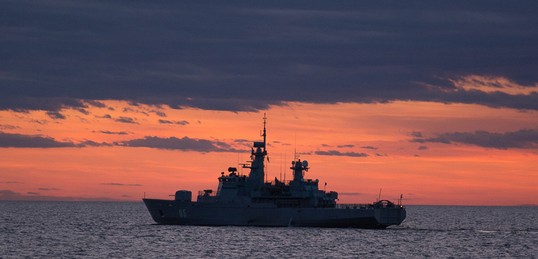
The great geographical distance may let you think that the rise of China. this is not a matter of concern for NATO. But in reality, the PRC's growing power has deep strategic implications for North Atlantic security - and the Alliance is well aware of this, as it explicitly stated with the London Declaration of December 2019.
How Russian Media Is Covering The European Elections
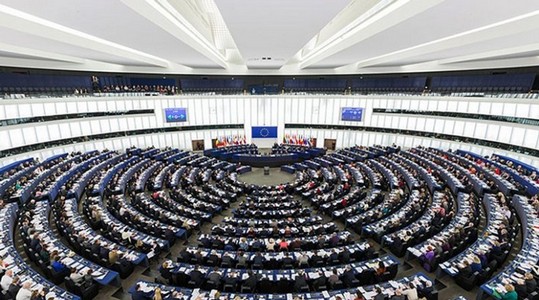 Just a few days ahead of the elections to renew the European Parliament, there is much debate about alleged Russian interferences in the democratic process.
Just a few days ahead of the elections to renew the European Parliament, there is much debate about alleged Russian interferences in the democratic process.But apart from alleged cyber-attacks and other covert activities, how do Russian state-sponsored media outlets in English cover the upcoming elections?
To answer this question, I examined the articles on the EP elections published on RT, Sputnik News and Russia Insider during the past week. While this is has not the ambition of being a fully-comprehensive study, it still allows to recognize a recurring pattern that reveals the objectives of Russia's mediatic strategy.
Read the article on Eurasia Review.
Photo credits: Diliff, Wikipedia Commons.
Geopolitics of Brexit
 Brexit is one of the most debated geopolitical issues of our time.
Brexit is one of the most debated geopolitical issues of our time. More than two years after the referendum that resulted in the decision to leave the EU, it is still unclear what the parting conditions will be like.
With such high degree of uncertainty, it is difficult to foresee how things will eventually unfold, but one thing is certain: Brexit will have a significant impact on the UK in the years to come.
This video by KJ Vids, to which I contributed, provides an overview of Brexit and it potential geopolitical consequences. Watch it by clicking here.
Will Italy Leave the Eurozone?
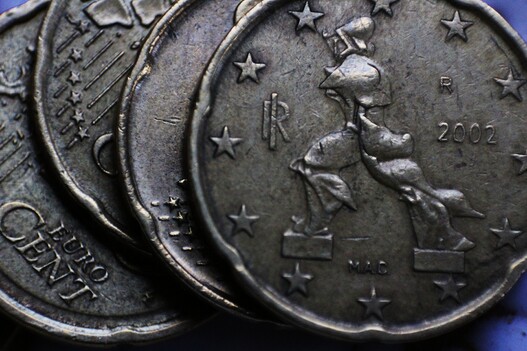 Following a decrease of 0.1% in the third quarter of 2018, Italy’s economy contracted of 0.2% in the final quarter of the same year.
Following a decrease of 0.1% in the third quarter of 2018, Italy’s economy contracted of 0.2% in the final quarter of the same year. As such, Italy is now officially in technical recession; just when it seemed to be recovering from the effects of the debt crisis.
This has sparked an intense political debate and has cast doubts over its economic prospects.
But what does this actually mean for Italy and the EU?
I was pleased to examine this issue for KJ Vids and to give my contribution to this video.
EU Takes Aim at Rule of Law Violators
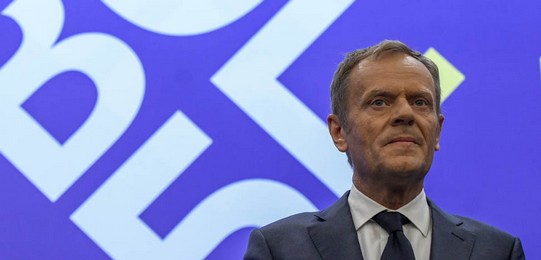 In January 2019, the European Parliament approved (with many amendments) a proposal for a Regulation that would enable the EU to suspend funding to a Member State if it doesn't respect the rule of law. As the time of this writing, the legislative procedure is still ongoing and act is now to be discussed by the Council.
In January 2019, the European Parliament approved (with many amendments) a proposal for a Regulation that would enable the EU to suspend funding to a Member State if it doesn't respect the rule of law. As the time of this writing, the legislative procedure is still ongoing and act is now to be discussed by the Council. While the primary objective seems to ensure that EU funds are properly used, some fear this may become a new instrument to punish violations of the Union's Fundamental Values. This comes in a context where Poland and Hungary have both been accused of not respecting the rule of law, to the point that the sanctioning procedure based on Article 7 has already been activated on them.
But what will be the impact of this new measure?
To know more about this topic, read my article on Geopolitical Monitor (subscription required).
Photo credit: Flickr
Outlook 2019: More Struggles Ahead for the EU
 For the European Union, 2019 will be a difficult year.
For the European Union, 2019 will be a difficult year. The exact terms of Brexit are still unclear; Italy has turned to Euroscepticism; Germany and France are experiencing domestic troubles, the V4 countries engaged in disputes with the EU, Greece is going to renew its Parliament while still struggling to recover from the financial crisis and Spain is focused on domestic issues.
No one seems in the condition to lead a reform of the EU; and only a few months ahead of the European Parliament elections, many are raising doubts over the legitimacy and the fundamental values of the European Institutions.
Read my forecast on Geopolitical Monitor (subscription required) to know more about the trends that will influence the EU throughout 2019.
Italy's Role in Europe
 Italy is facing a delicate political and economic situation.
Italy is facing a delicate political and economic situation.Once a centre of the Western Civilization, it gradually lost its centrality throughout the centuries. More recently, it plunged in a severe recession following the global financial crisis, and it has shown signs of recovery only in the past few years.
Yet, it remains the Eurozone’s third largest economy and fourth in the EU as a whole, and it remains one of the most influential countries in the Union, of which it has been a supporter for decades.
However, the current coalition government formed by the Five Star Movement and the League is casting doubts over Italy’s commitment to the EU, and notably over its budgetary rules. This in turn raises concerns over its own economic recovery and also on the tenure of the EU as a whole, which is caught between two diverging views of European integration.
Will Brexit Open the Door for an EU Army?
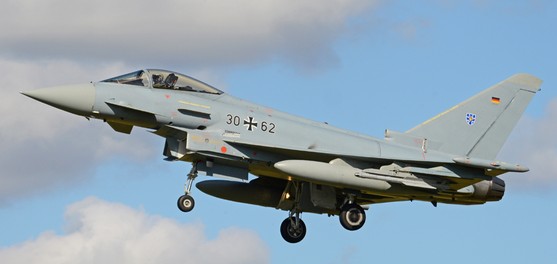 In the last weeks on November 2018, Brexit and Macron's call for a 'EU Army' have been among the most debated issues in the media. Yet, they have been discussed as two separate issues, with very (if any) attention at what is the link between them.
In the last weeks on November 2018, Brexit and Macron's call for a 'EU Army' have been among the most debated issues in the media. Yet, they have been discussed as two separate issues, with very (if any) attention at what is the link between them. In this article for Geopolitical Monitor, I examine Britain's role in the CSDP (Common Security & Defence Policy) and the effects of Brexit on it and on the possibility of creating a unified "EU Army".
Link here (subscription required).
Photo credits: Flickr, Alan Wilson
PS: I know that it is a German Eurofighter and not a British one, but I am just using the same photo that appears in the original article.
Will There Ever Be a Common "EU Army"?
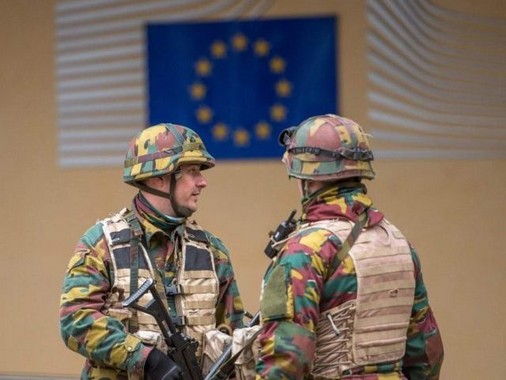 In an era of mounting rivalry between great powers, and with the Trump administration raising doubts over the America’s commitment to protect Europe, the recent declarations by French President Emmanuel Macron over the need of a 'European Army' to protect the continent against Russia, China and even the United States have caused much political debate.
In an era of mounting rivalry between great powers, and with the Trump administration raising doubts over the America’s commitment to protect Europe, the recent declarations by French President Emmanuel Macron over the need of a 'European Army' to protect the continent against Russia, China and even the United States have caused much political debate. But will there ever be a European Union Army?
Photo credit: AFP / Getty Images / Philippe Huguen, breitbart.com
Is the European Union On The Edge Of A Civil War? - Article & Video
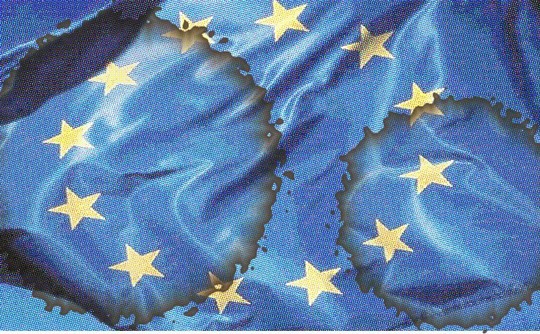 Is the European Union on the Edge of a Civil War?
Is the European Union on the Edge of a Civil War?A simple question, yet a rather shocking and dreadful one.
If we observe the current status of the EU, its future appears uncertain at best. Brexit is unfolding. A trade conflict with the US is looming. Social tensions are growing due to the combined effects of the debt crisis and of immigration flows from extra-EU countries. Consensus is lacking over the evolution of the common institutions, and anti-EU political forces are on the rise all over the continent (the new Italian government is just the latest example and probably strongest expression of this trend).
In such a context, it seems that the Union is destined to be more and more divided, to the point that French President E. Macron stated that the EU is experiencing a "civil war" over its fundamental values.
This prompted me to raise the provocative question. And interestingly, if we observe the past, we can see that the situation of today's EU is strikingly similar to that of another "Union"; namely the United States at the eve of the War of Secession. Will the EU also plunged into civil war, as the US did in the 1860s?
EU: “Ever Closer Union” Hits a Wall with the Visegrád Four
 Viktor Orban's re-election as PM in Hungary and Macron's "civil war" statement are both indicators of the diverging visions on the EU: one in favor of more integration, the other wanting to protect the core sovereign rights and the national identity of member states. The latter is embodied by the four countries forming the Visegrád Group, whose influence in European affairs is increasing.
Viktor Orban's re-election as PM in Hungary and Macron's "civil war" statement are both indicators of the diverging visions on the EU: one in favor of more integration, the other wanting to protect the core sovereign rights and the national identity of member states. The latter is embodied by the four countries forming the Visegrád Group, whose influence in European affairs is increasing. Now, beyond the politicized discourse surrounding the V4 states, the existence of these diverging visions is a fact. Both are legitimate and present their pros and cons. Moreover, behind the vision supported by the Visegrád countries there are precise historical causes and geopolitical factors; which must be taken into account to understand their stance.
Photo credit: Kancelaria Premiera, Flickr, modified
The Catalan Independence Referendum: History, Politics and International Law Interplay
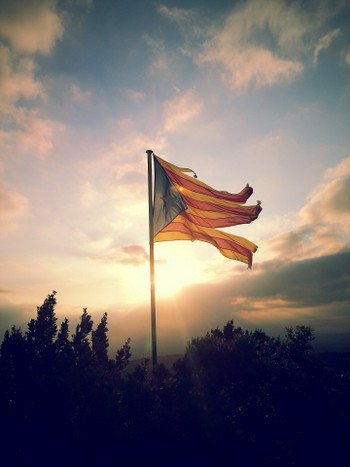 This long comment focuses on the independence referendum in Catalonia held on October 1st 2017, an event that attracted significant attention by the media, especially after the moves by the Spanish central government to block it.
This long comment focuses on the independence referendum in Catalonia held on October 1st 2017, an event that attracted significant attention by the media, especially after the moves by the Spanish central government to block it.The aim of this article is not to examine the political debate around it in Spain and in Europe, to assess its economic impact, and even less to determine “who is right” and whether Catalonia should become independent or not. Instead, what I wish to do is to raise two often neglected but extremely important aspects of the issue, namely the historical roots of the Catalonian separatism and the problem’s nature from the perspective of international law.
